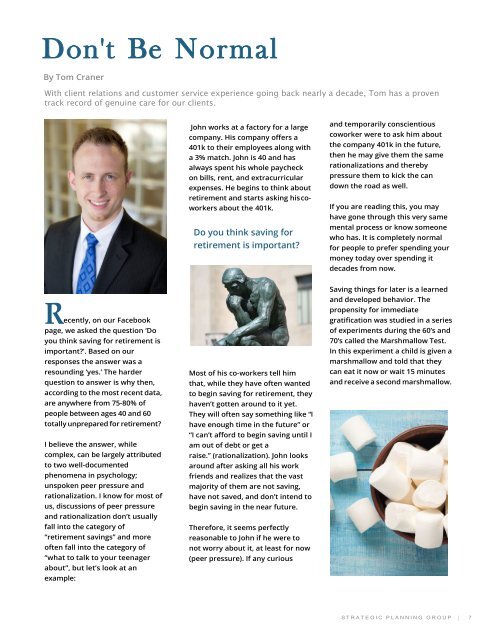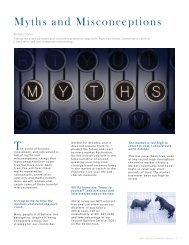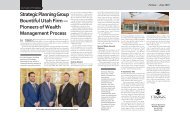Create successful ePaper yourself
Turn your PDF publications into a flip-book with our unique Google optimized e-Paper software.
Don't Be Normal<br />
By Tom Craner<br />
With client relations and customer service experience going back nearly a decade, Tom has a proven<br />
track record of genuine care for our clients.<br />
John works at a factory for a large<br />
company. His company offers a<br />
401k to their employees along with<br />
a 3% match. John is 40 and has<br />
always spent his whole paycheck<br />
on bills, rent, and extracurricular<br />
expenses. He begins to think about<br />
retirement and starts asking his coworkers<br />
about the 401k.<br />
Do you think saving for<br />
retirement is important?<br />
and temporarily conscientious<br />
coworker were to ask him about<br />
the company 401k in the future,<br />
then he may give them the same<br />
rationalizations and thereby<br />
pressure them to kick the can<br />
down the road as well.<br />
If you are reading this, you may<br />
have gone through this very same<br />
mental process or know someone<br />
who has. It is completely normal<br />
for people to prefer spending your<br />
money today over spending it<br />
decades from now.<br />
R ecently, on our Facebook<br />
page, we asked the question ‘Do<br />
you think saving for retirement is<br />
important?’. Based on our<br />
responses the answer was a<br />
resounding ‘yes.’ The harder<br />
question to answer is why then,<br />
according to the most recent data,<br />
are anywhere from 75-80% of<br />
people between ages 40 and 60<br />
totally unprepared for retirement?<br />
I believe the answer, while<br />
complex, can be largely attributed<br />
to two well-documented<br />
phenomena in psychology;<br />
unspoken peer pressure and<br />
rationalization. I know for most of<br />
us, discussions of peer pressure<br />
and rationalization don’t usually<br />
fall into the category of<br />
“retirement savings” and more<br />
often fall into the category of<br />
“what to talk to your teenager<br />
about”, but let’s look at an<br />
example:<br />
Most of his co-workers tell him<br />
that, while they have often wanted<br />
to begin saving for retirement, they<br />
haven’t gotten around to it yet.<br />
They will often say something like “I<br />
have enough time in the future” or<br />
“I can’t afford to begin saving until I<br />
am out of debt or get a<br />
raise.” (rationalization). John looks<br />
around after asking all his work<br />
friends and realizes that the vast<br />
majority of them are not saving,<br />
have not saved, and don’t intend to<br />
begin saving in the near future.<br />
Therefore, it seems perfectly<br />
reasonable to John if he were to<br />
not worry about it, at least for now<br />
(peer pressure). If any curious<br />
Saving things for later is a learned<br />
and developed behavior. The<br />
propensity for immediate<br />
gratification was studied in a series<br />
of experiments during the 60’s and<br />
70’s called the Marshmallow Test.<br />
In this experiment a child is given a<br />
marshmallow and told that they<br />
can eat it now or wait 15 minutes<br />
and receive a second marshmallow.<br />
S T R A T E G I C P L A N N I N G G R O U P | 7

















